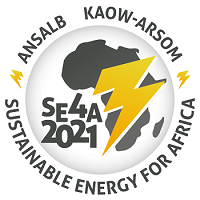The following five topics will be discussed during the first three days (Monday to Wednesday) of the SE4A 2021 conference, addressing an international audience concerned with socio-economic development and access to energy :
- Energy - key for achieving the Sustainable Development in Africa
- (1) Access to Energy and social & economic development ("Agenda 2030", UN 2015 and “AGENDA 2063 - The Africa We Want”, AU 2015)
- (2) Appropriation of renewable energy technologies, dispatchable (hydroelectric, biomass) as well as non-dispatchable (sun, wind, tides and waves)
- (3) Energy systems that are secured, competitive and affordable, and compatible with a sustainable and inclusive development of the continent, integrated in a modern circular economy (saving of raw materials, energy efficiency, environmental preservation)
- (1) Access to Energy and social & economic development ("Agenda 2030", UN 2015 and “AGENDA 2063 - The Africa We Want”, AU 2015)
- Energy value chain (including conversion technologies and energy services)
- (4) Management of energy based services in an inclusive and sustainable way (in rural and urban regions), using modern energy production, transport, distribution and storage technologies
- (5) Optimisation of energy based services for big consumers (heavy industries, railroads, megacities, etc.): systematic digitalization, energy storage, etc.
- (6) Energy supply chain for all types of consumers : centralised production (based on fossil fuels, hydroelectricity, nuclear power) versus distributed production (micro- and mini-networks often based on renewable energies)
- (4) Management of energy based services in an inclusive and sustainable way (in rural and urban regions), using modern energy production, transport, distribution and storage technologies
- Research, innovation & education in connection with the energy-intensive sectors
- (7) Materials and sustainable development: balancing use of natural resources with environmental concerns in the energy value chain; state of the art of eco-materials and advanced characterization methods and tools (including standards), development of energy efficient models.
- (8) Reinforcement of education and research capacities to meet energy needs of transportation, residential users, industry and services; valuation of scientific expertise in Africa to promote and develop the label “Made in Africa”, specifically in the field of local natural and energy resources (materials, building technologies, etc.)
- (9) Multidisciplinary approach for a sustainable access to energy: contribution of economic, legal and social sciences to analyse and take into account factors impacting the perception of energy services and usages, their affordability and the achievement of infrastructures.
- (7) Materials and sustainable development: balancing use of natural resources with environmental concerns in the energy value chain; state of the art of eco-materials and advanced characterization methods and tools (including standards), development of energy efficient models.

